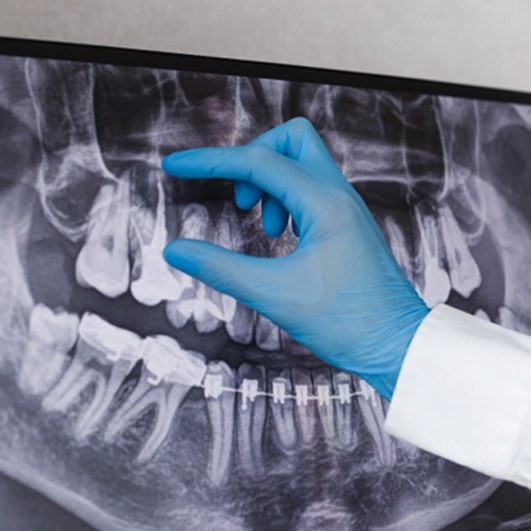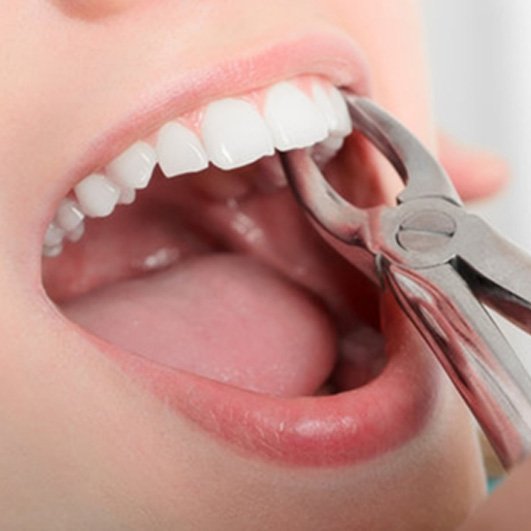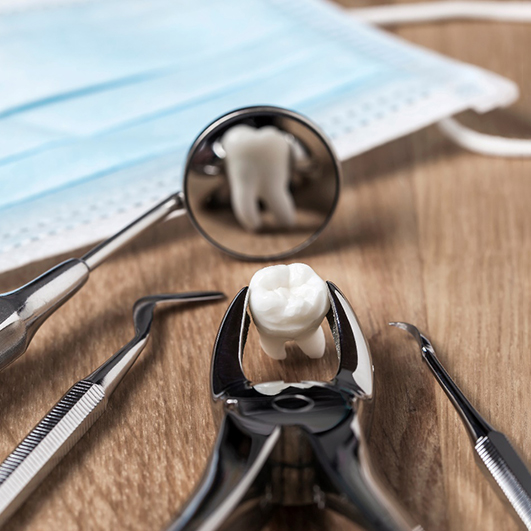
Tooth Extractions – Eatontown, NJ
Safely and Strategically Assisting Your Smile
At NU Dental Eatontown, we understand the positive impact that a healthy smile has on your livelihood—which is why Dr. Gizachew and his team work tirelessly to ensure that all of their patients are able to maintain vital, beautiful, and fully-functional smiles. However, sometimes a tooth needs to be extracted in order to achieve this! We’re proud to offer in-house tooth extractions in a quick manner and comfortable setting so that your smile is able to urgently get the assistance it needs. Continue reading below to learn more about tooth extractions and what you can expect both during and after the process, or feel free to contact us if you have any additional questions or would like to arrange a visit.
Why Choose NU Dental Eatontown for Tooth Extractions?
- Experienced Dentist Equipped with Advanced Technology
- Beautiful, Modern Tooth-Replacement Options
- Wisdom Tooth Extractions Available
Reasons Why Tooth Extractions Are Necessary

A tooth extraction is never recommended lightly; if there’s even the slightest chance that the affected tooth can be saved, we’ll likely recommend a restorative treatment option like root canal therapy or a dental crown. But in some cases, the procedure is deemed necessary, especially if you’re affected by any of the following issues:
- Extensive decay or permanent, irreparable damage in a tooth.
- Severe dental infection that could possibly spread to other teeth.
- Advanced gum disease or jawbone deterioration.
- A baby tooth that hasn’t fallen out on its own.
- Wisdom teeth that need to be removed, either due to impaction or to prevent future oral health issues.
The Process of Removing a Tooth

Tooth extractions are often categorized into two distinct methods: simple extraction and surgical extraction. For instances when the tooth that needs removal has fully emerged above the gumline, a simple extraction is utilized. We can numb your mouth and gently grip the tooth with a special pair of forceps. We’ll then gently rock your tooth back and forth until it naturally separates from your gum tissue.
If the tooth hasn’t fully erupted from your gums, it’ll need to be removed via surgical extraction. This method involves making a small incision in the gums to access more of the tooth. The only way for us to determine which method of extraction is best for your situation is for you to visit us for a consultation. Together, we’ll work with you to plan out every detail of your treatment to ensure your total comfort.
Tooth Extraction Aftercare

To ensure that your mouth heals properly and quickly following your extraction, our team will provide you with a detailed list of post-op instructions to follow. Some basic aftercare tips include:
- Take your over-the-counter and prescribed pain relievers as instructed.
- Keep the surgical site clean by brushing and flossing around it carefully. 24 hours after your procedure, you can rinse your mouth using a mixture of a cup of warm water with ½ tsp of salt.
- Get plenty of rest and avoid exercise or strenuous physical activity.
- Stay away from hard, crunchy, sticky, or spicy foods for at least several days.
- Be sure to drink plenty of water to stay properly hydrated; however, don’t use a drinking straw, as the suction can disrupt your mouth’s healing process.
- Avoid smoking and using tobacco products.
You might experience some swelling, light bleeding, and general discomfort as you recuperate from your tooth extraction in Eatontown. However, if these symptoms don’t clear up after a few days, don’t hesitate to contact us right away.
Understanding the Cost of Tooth Extractions

Before committing to having one of your teeth removed, it’s important to understand every aspect of the treatment—including the expected cost! While we can’t give you an exact estimate without first examining your mouth, we can give you a much better idea about what factors affect the cost, what you can expect to pay out of pocket, and what you can do to make the procedure more affordable.
Factors That Can Affect Tooth Extraction Cost

No two tooth extractions are the same, and there are several factors that contribute to what you can expect to pay for the procedure:
- The location of the tooth (back teeth are typically more difficult to remove than front teeth)
- The total number of teeth that need to be removed
- What method of extraction is utilized (simple vs. surgical)
- Whether the tooth is fully/partially erupted or still trapped beneath the gumline.
- The type of anesthesia/sedation methods that are used
Upon visiting us for a consultation, Dr. Gizachew will be able to inspect your mouth and determine an appropriate course of action coupled with an expected cost of treatment.
Does Dental Insurance Cover Tooth Extractions?

It’s fairly common for most dental insurance plans to cover around 50% of the cost of tooth extractions, assuming your deductible has been met (this includes wisdom teeth). However, there might still be limitations or restrictions, such as a waiting period before coverage kicks in, or a limit to the number of teeth that are covered. Every plan is different, so it’s worthwhile to touch base with your insurance provider about a certain treatment’s cost. In any case, our team is happy to work with you to ensure that you’re taking full advantage of your benefits!
How to Make Tooth Extractions Affordable

Even if you don’t have dental insurance, there are still several ways you can make your tooth extraction in Eatontown more affordable! We’re pleased to offer in-house membership savings plans, all with varying tiers of coverage based on your needs. We’re also proud to offer financing options, such as CareCredit, to break your treatment cost into affordable monthly installments rather than one lump sum. If the extracted tooth needs to be replaced, we also have specials to help lower the cost of the chosen replacement solution.
For additional information about how much you can expect to pay for your tooth extraction, our team is here to assist you—don’t hesitate to give us a call today!
Tooth Extractions FAQs

Has your dentist recommended that you undergo a tooth extraction in Eatontown? While this may seem unexpected, there might be a viable reason for removing one of your pearly whites. Since you’ll likely have concerns about your treatment, our team has collected and answered some of the most common questions we get about this procedure. You can feel more confident about the process and how it’ll help preserve your oral health. Keep reading or reach out to us today to learn more or schedule your consultation.
Does Getting a Tooth Extracted Hurt?
Most people are reluctant to undergo a dental procedure due to their assumption that it’ll be painful. However, regardless if you’re getting one or several teeth removed, the very first step in your treatment will be to completely numb your mouth. Our team will administer a local anesthetic to ensure that you remain pain-free throughout the process. We can even offer you sedation dentistry to further lower your ability to register pain and keep you as relaxed as possible.
While you shouldn’t feel discomfort during your procedure, it’s normal to experience soreness after your appointment. Be sure to follow your dentist’s aftercare instructions for a smooth and comfortable recovery. If you notice any pain that worsens or shows signs of infection, notify us right away.
How Should I Prepare for My Tooth Extraction?
Our team will typically provide you with specific guidelines on both your aftercare instructions and how you should prepare for your appointment. Before your scheduled visit, be sure to ask your dentist any questions you might have. During this time, they can inform you of what you’ll need to bring to the office or if you can have something to eat before arriving. These instructions may include only drinking water in the morning or taking prescribed medications. Since you’ll likely be sedated, you’ll want to arrange for a friend or family member to drive you to and from your appointment.
Can I Leave the Space Empty After a Tooth Extraction?
Even if you’re only getting one of your molars extracted, and it isn’t very visible to others, you might want to think twice about not replacing it. Not only will you want to preserve a complete smile, but having all the necessary pearly whites will make it easier for you to chew properly and speak clearly in the long run. Having at least one missing tooth can lead to difficulties with chewing, which can result in malnutrition and indigestion. We highly recommend that you schedule a visit to go over your tooth-replacement options after you’ve finished recovering.
Can I Smoke After Getting a Tooth Extracted?
In addition to being closely associated with a higher risk of oral cancer, smoking can also interfere with your healing process after undergoing tooth extraction. Whether you use tobacco products like cigars, cigarettes, or e-cigarettes, you can end up increasing the chance of other complications, such as infection or inflammation in the gums. Although it’s best to quit smoking altogether, you should at least wait five days or two weeks after your appointment. If you have difficulty quitting this habit, be sure to consult our team so that we can help you prepare ahead of time for a successful recovery.